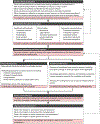The limits of refusal: An ethical review of solid organ transplantation and vaccine hesitancy
- PMID: 33370501
- PMCID: PMC8298607
- DOI: 10.1111/ajt.16472
The limits of refusal: An ethical review of solid organ transplantation and vaccine hesitancy
Abstract
Patients pursuing solid organ transplantation are encouraged to receive many vaccines on an accelerated timeline. Vaccination prior to transplantation offers the best chance of developing immunity and may expand the pool of donor organs that candidates can accept without needing posttransplant therapy. Furthermore, transplant recipients are at greater risk for acquiring vaccine-preventable illnesses or succumbing to severe sequelae of such illnesses. However, a rising rate of vaccine refusal has challenged transplant centers to address the phenomenon of vaccine hesitancy. Transplant centers may need to consider adopting a policy of denial of solid organ transplantation on the basis of vaccine refusal for non-medical reasons (i.e., philosophical or religious objections or personal beliefs that vaccines are unnecessary or unsafe). Arguments supporting such a policy are motivated by utility, stewardship, and beneficence. Arguments opposing such a policy emphasize justice and respect for persons, and seek to avoid worsening inequities or medical coercion. This paper examines these arguments and situates them within the special cases of pediatric transplantation, emergent transplantation, and living donation. Ultimately, a uniform national policy addressing vaccine refusal among transplant candidates is needed to resolve this ethical dilemma and establish a consistent, fair, and standard approach to vaccine refusal in transplantation.
Keywords: editorial/personal viewpoint; ethics; ethics and public policy; infectious disease; organ allocation; organ procurement and allocation; pediatrics; preventive healthcare; recipient selection; vaccine.
© 2020 The American Society of Transplantation and the American Society of Transplant Surgeons.
Figures
References
-
- Gillon R Defending the four principles approach as a good basis for good medical practice and therefore for good medical ethics. J Med Ethics. 2015;41(1):111–116. - PubMed
-
- Ethical Principles in the Allocation of Human Organs. Organ Procurement and Transplantation Network. https://optn.transplant.hrsa.gov/resources/ethics/ethical-principles-in-.... Updated June, 2014. Accessed October 18, 2019.
-
- General Considerations in Assessment for Transplant Candidacy. Organ Procurement and Transplantation Network. https://optn.transplant.hrsa.gov/resources/ethics/general-considerations.... Updated January, 2014. Accessed October 18, 2020.
Publication types
MeSH terms
Substances
Grants and funding
LinkOut - more resources
Full Text Sources
Other Literature Sources
Medical


